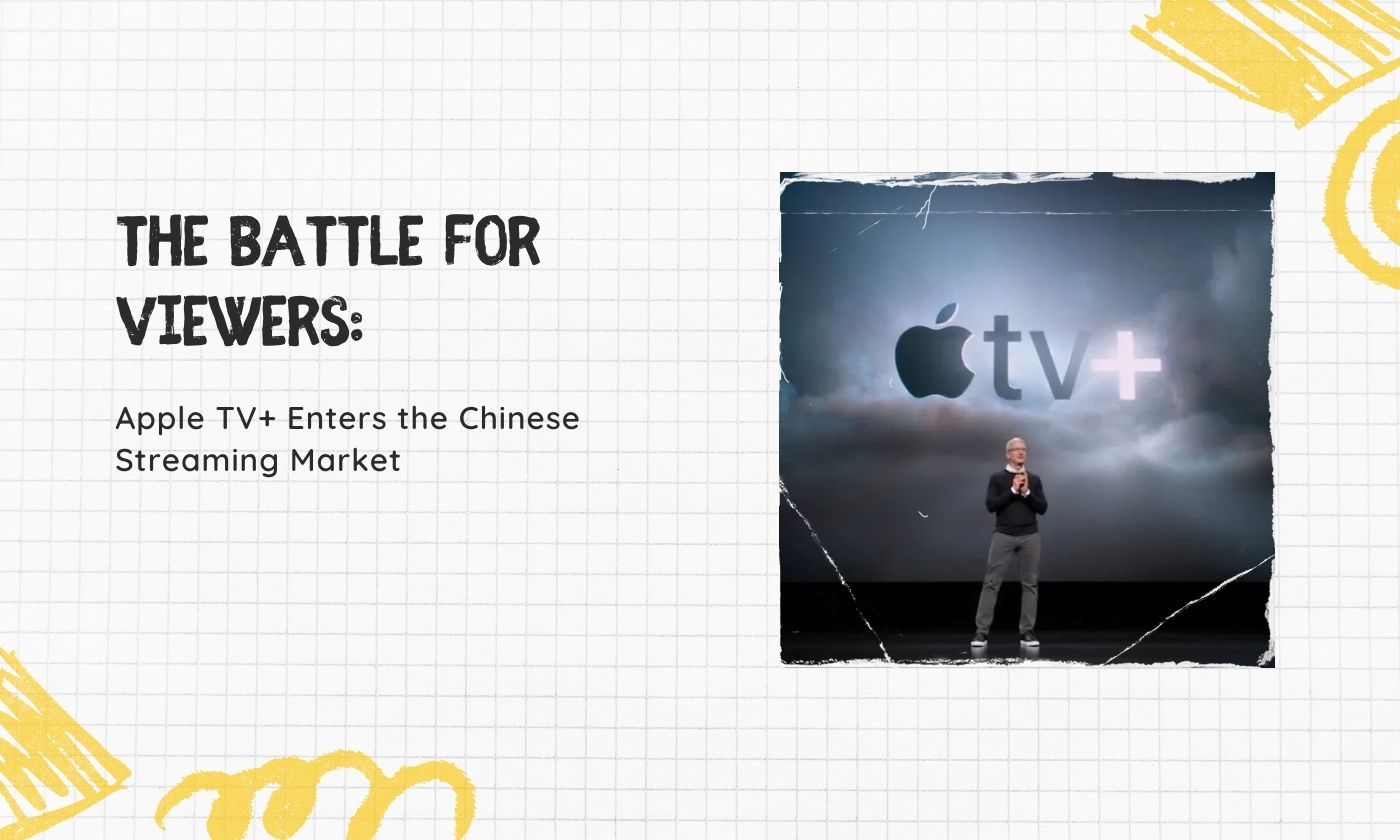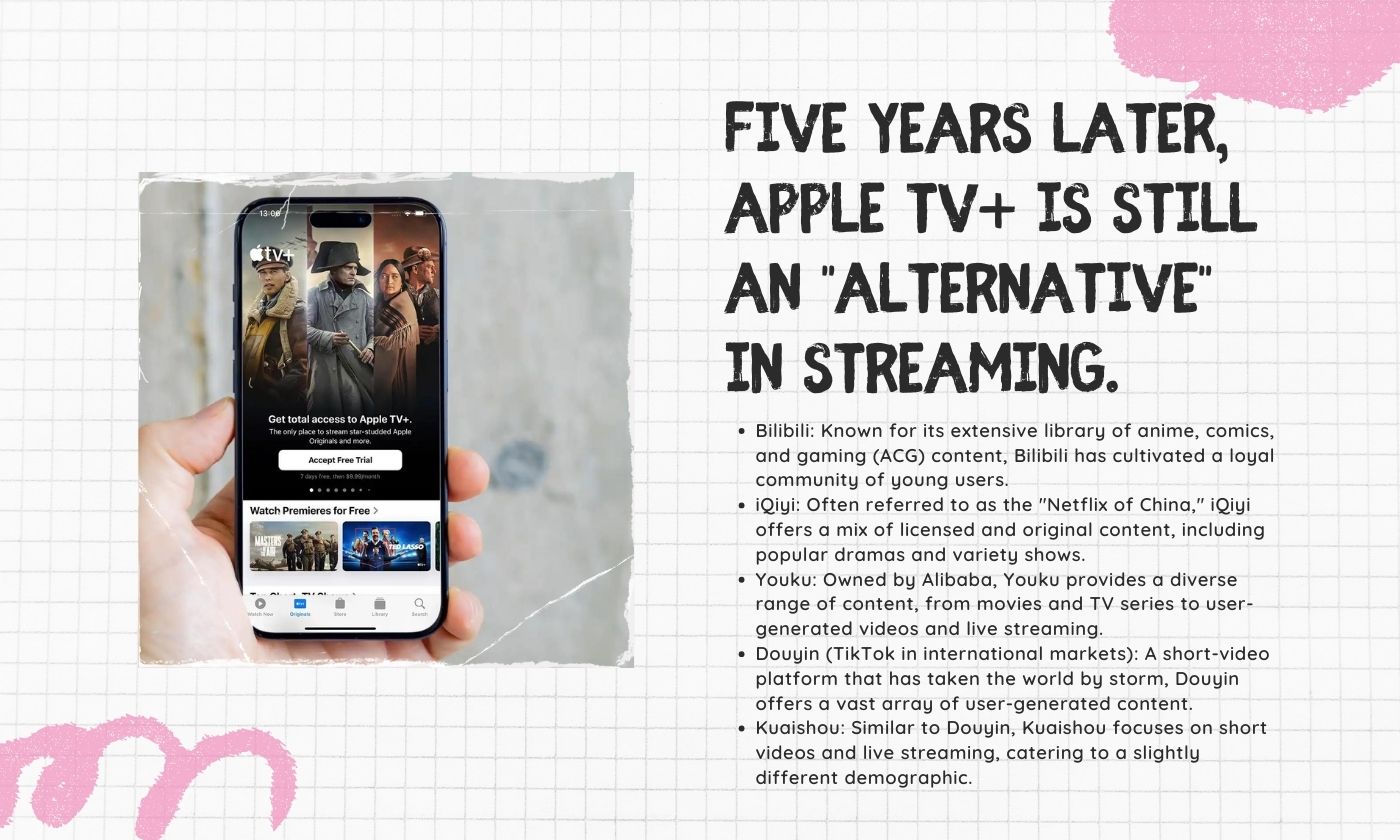Introduction
Apple TV+, the renowned streaming service from Apple, has made significant strides in the global market since its inception. Recently, Apple has sought to expand its reach into China, a move that could potentially revolutionize its presence in the streaming industry. By joining forces with China Mobile, Apple TV+ aims to tap into a vast user base and navigate the stringent content regulations in the Chinese market. Despite this strategic collaboration, Apple faces a formidable challenge in competing with established Chinese streaming giants collectively known as Youaiteng (Youku, iQiyi, and Tencent Video).
Table of Contents

Streaming Media: An Overview
Definition and importance of streaming media
Streaming media refers to the continuous delivery of multimedia content, such as audio, video, and other digital media, over the internet. Unlike traditional media formats that require downloading, streaming media allows users to consume content in real-time, enhancing convenience and accessibility. The rise of high-speed internet and the proliferation of smart devices have fueled the popularity of streaming services, transforming how people access entertainment and information.
History and Evolution of Streaming Media
The concept of streaming media dates back to the early days of the internet, but it wasn’t until the mid-2000s that it gained mainstream traction. Pioneers like YouTube and Netflix played pivotal roles in popularizing streaming as a viable alternative to traditional media consumption. Over the years, technological advancements in data compression, bandwidth, and content delivery networks (CDNs) have significantly improved the quality and reliability of streaming services.
Global and domestic streaming media platforms
Globally, platforms like Netflix, Amazon Prime Video, Disney+, and Hulu dominate the streaming landscape, offering diverse content libraries and exclusive originals. In China, the streaming media market is fiercely competitive, with domestic platforms such as Bilibili, iQiyi, Youku, Douyin, Kuaishou, and NetEase Cloud Music leading the charge. These platforms have tailored their offerings to cater to the unique preferences and consumption habits of Chinese audiences.
Role of the Internet and Data Costs
The widespread availability of high-speed internet and the reduction in data costs have been critical in driving the adoption of streaming media. In regions with robust internet infrastructure, users can enjoy seamless streaming experiences with minimal buffering. Additionally, affordable data plans have made it easier for users to access streaming content on the go, further enhancing the convenience and appeal of these services.
The Chinese streaming market
Current State of the Market
The Chinese streaming market is one of the largest and most dynamic in the world. With hundreds of millions of active users, platforms like Youku, iQiyi, and Tencent Video (collectively known as Youaiteng) dominate the landscape, offering a vast array of content, from movies and TV shows to user-generated videos and live broadcasts. The competition is intense, with platforms constantly innovating to attract and retain viewers.
Key Players: Bilibili, iQiyi, Youku, Douyin, Kuaishou, and NetEase Cloud Music
- Bilibili: Known for its extensive library of anime, comics, and gaming (ACG) content, Bilibili has cultivated a loyal community of young users.
- iQiyi: Often referred to as the “Netflix of China,” iQiyi offers a mix of licensed and original content, including popular dramas and variety shows.
- Youku: Owned by Alibaba, Youku provides a diverse range of content, from movies and TV series to user-generated videos and live streaming.
- Douyin (TikTok in international markets): A short-video platform that has taken the world by storm, Douyin offers a vast array of user-generated content.
- Kuaishou: Similar to Douyin, Kuaishou focuses on short videos and live streaming, catering to a slightly different demographic.
- NetEase Cloud Music is a leading music streaming service in China, offering an extensive library of songs and user-generated playlists.
Regulatory Environment and Content Censorship
The Chinese streaming market is heavily regulated, with strict content censorship laws in place. Platforms must navigate a complex approval process to ensure their content complies with government regulations. This includes removing politically sensitive material, adhering to cultural norms, and promoting positive social values. These regulations pose a significant challenge for foreign streaming services looking to enter the market.
Consumer Preferences and Viewing Habits
Chinese viewers have distinct preferences and viewing habits, often favoring local content that resonates with their cultural and social context. Popular genres include historical dramas, reality shows, and variety programs. Additionally, the rise of mobile streaming has shifted viewing habits, with many users consuming content on smartphones and tablets. Understanding these preferences is crucial for any streaming service aiming to succeed in China.

Apple TV+ and its Global Footprint
Launch and Growth of Apple TV+
Apple TV+ was launched on November 1, 2019, as part of Apple’s broader push into the services sector. Positioned as a premium streaming service, Apple TV+ distinguished itself by focusing on original content with a relatively small but carefully curated library of shows and movies. Despite its late entry into the crowded streaming market, Apple TV+ has managed to carve out a niche for itself, thanks to its high-quality productions and integration with Apple’s ecosystem.
Content Strategy and Original Productions
Apple TV+ has adopted a content strategy centered on original productions. This includes critically acclaimed series such as “The Morning Show,” “Ted Lasso,” and “For All Mankind,” as well as award-winning films like “CODA.” By investing in original content, Apple aims to differentiate itself from competitors and create a unique identity for its streaming service.
Comparative Analysis with Competitors: Netflix, Disney+, Prime Video
Compared to Netflix, Disney+, and Prime Video, Apple TV+ has a smaller content library but emphasizes quality over quantity. While Netflix offers a vast array of content across various genres and Disney+ leverages its extensive catalog of beloved franchises, Apple TV+ focuses on premium original productions. Prime Video, on the other hand, combines a robust content library with the benefits of Amazon’s broader ecosystem, including shopping and smart home integration.
Success Stories and Award-Winning Content
Apple TV+ has garnered critical acclaim and several prestigious awards for its original content. “Ted Lasso” has won multiple Emmy Awards, while “CODA” made history by becoming the first film from a streaming service to win the Academy Award for Best Picture. These successes underscore Apple’s commitment to producing high-quality content and enhancing its reputation in the streaming industry.
Apple TV+ in China: Strategic Moves
Negotiations with China Mobile
According to reports, Apple began discussions with China Mobile in 2023 to explore the possibility of launching Apple TV+ in China. This strategic move aims to leverage China Mobile’s extensive user base and navigate the regulatory landscape. By partnering with a local telecom giant, Apple hopes to facilitate the entry of its streaming service into the Chinese market.
Potential User Base and Market Size
China Mobile boasts over 940 million subscribers, providing a massive potential user base for Apple TV+. If successfully integrated, Apple TV+ could reach millions of new viewers, significantly expanding its market presence. This collaboration also offers an opportunity to attract users who are already familiar with and trust the Apple brand.
Regulatory Compliance and Localization Challenges
To comply with Chinese regulations, Apple TV+ will need to undergo significant localization. This includes adapting content to meet censorship requirements, translating and dubbing shows into Mandarin, and possibly creating original content tailored to Chinese audiences. Ensuring regulatory compliance while maintaining the quality and integrity of its content will be a major challenge for Apple.
Expected Subscription Model and Pricing
In the United States, Apple TV+ is priced at $9.99 per month, with family sharing options available. For the Chinese market, Apple may need to adjust its pricing strategy to align with local competitors and consumer expectations. Offering competitive subscription rates and localized pricing plans will be crucial for attracting and retaining subscribers in China.
Apple’s Strategy in China
Past Efforts to Introduce Services in China
Apple has a history of adapting its services to the Chinese market. For instance, it has previously partnered with local companies to offer Apple Music and has tailored its App Store offerings to comply with local regulations. These efforts highlight Apple’s commitment to understanding and catering to the unique needs of Chinese consumers.
Key Partnerships: Tencent, Vision Pro, Apple Arcade, Apple Fitness+
Apple’s partnership with Tencent to offer popular apps on the Vision Pro, as well as its plans to introduce Apple Arcade and Apple Fitness+ in China, demonstrate its strategic approach to the market. These partnerships aim to enhance the overall user experience and create a more integrated ecosystem for Chinese users, potentially driving higher adoption rates for Apple TV+.
Synergies with Apple’s Hardware Ecosystem
Apple TV+ benefits from its seamless integration with Apple’s hardware products, such as iPhones, iPads, Macs, and Apple TVs. This synergy offers a smooth user experience, leveraging features like AirPlay, iCloud integration, and Siri voice control. For Chinese consumers who already use Apple devices, Apple TV+ could become an attractive addition to their digital ecosystem.
Marketing and Promotional Activities
To successfully launch Apple TV+ in China, Apple will need to invest in targeted marketing and promotional activities. This includes leveraging social media platforms, partnering with local influencers, and running advertising campaigns that resonate with Chinese audiences. Effective marketing will be essential to build brand awareness and drive subscriptions.

Content Offerings on Apple TV+
Overview of Available Content
Apple TV+ offers a curated selection of original content, including dramas, comedies, documentaries, and feature films. The platform prides itself on high production values and storytelling excellence, appealing to a discerning audience that values quality over quantity.
Popular Shows and Movies
Some of the most popular shows on Apple TV+ include “The Morning Show,” “Ted Lasso,” “For All Mankind,” and “See.” These series have garnered critical acclaim and a loyal fan base. On the movie front, films like “CODA,” “Greyhound,” and “Palmer” have received positive reviews and accolades.
Exclusive Content and Originals
Apple TV+ is committed to producing exclusive content that cannot be found on other platforms. This includes collaborations with renowned creators and production houses, ensuring a steady stream of fresh and compelling content. By focusing on exclusivity, Apple aims to differentiate its offering and attract subscribers seeking unique viewing experiences.
Sports Broadcasting: MLB, MLS, and Future Plans
In addition to scripted content, Apple TV+ has ventured into sports broadcasting. It holds the rights to stream Major League Baseball (MLB) and Major League Soccer (MLS) games, adding a new dimension to its content library. Apple is reportedly eyeing the FIFA Club World Cup in 2025, with plans to invest significantly in securing exclusive broadcast rights.
Competitive Analysis: Apple TV+ vs. Youaiteng
Market Share and User Base Comparison
Youaiteng (Youku, iQiyi, Tencent Video) dominates the Chinese streaming market with a substantial share of the user base. These platforms have deep-rooted connections with Chinese viewers, extensive content libraries, and established distribution channels. Apple TV+ will need to carve out its niche and build a loyal user base from scratch.
Content Library and Variety
While Youaiteng offers vast content libraries, including a mix of licensed and original content, Apple TV+ focuses on a smaller, high-quality selection of original productions. The challenge for Apple will be to expand its content library without compromising its commitment to quality, offering a diverse range of genres and formats to appeal to Chinese viewers.
Pricing and subscription models
Pricing is a critical factor in attracting subscribers. Domestic platforms like Youaiteng offer competitive pricing, often with tiered subscription models and promotional discounts. Apple TV+ will need to strategically price its service to compete effectively, possibly offering introductory discounts, bundled packages with other Apple services, and localized pricing plans.
Strengths and Weaknesses of Each Platform
- Apple TV+: Strengths include high-quality original content, seamless integration with Apple devices, and a focus on premium viewing experiences. Weaknesses involve a smaller content library and the challenge of navigating regulatory and cultural barriers.
- Youaiteng: Strengths include extensive content libraries, strong local market knowledge, and established user bases. Weaknesses may include varying content quality and intense competition within the domestic market.
Potential Challenges and Barriers
Content Censorship and Approval Process
Navigating China’s stringent content censorship and approval process will be a significant hurdle for Apple TV+. Ensuring compliance with local regulations without compromising the quality and integrity of its content will require careful planning and collaboration with local partners.
Cultural and aesthetic differences
Chinese viewers have distinct cultural and aesthetic preferences that differ from Western audiences. Apple TV+ will need to tailor its content offerings to resonate with these preferences, possibly investing in local productions and collaborating with Chinese creators to create culturally relevant content.
Local Competition and Established User Bases
The dominance of established domestic platforms poses a major challenge for Apple TV+. Competing against Youaiteng, which has a deep-rooted presence and loyal user base, will require innovative strategies, unique content offerings, and effective marketing campaigns.
Technical and operational hurdles
Launching and operating a streaming service in China involves technical and operational challenges, such as ensuring reliable content delivery, managing bandwidth, and providing customer support. Apple will need to invest in robust infrastructure and establish efficient operational processes to deliver a seamless user experience.
The Role of China Mobile
China Mobile’s Influence and Reach
China Mobile, as the largest telecom operator in China, offers a vast network and extensive reach. Partnering with China Mobile provides Apple with a powerful ally to navigate the regulatory landscape, tap into a large user base, and leverage existing distribution channels.
Migu: China Mobile’s Streaming Service
Migu, a subsidiary of China Mobile, offers a range of streaming services, including sports, music, and video content. The collaboration between Apple TV+ and Migu could create synergies, combining Apple’s high-quality content with Migu’s extensive content library and distribution network.
Potential Synergies and Collaboration Benefits
The partnership between Apple TV+ and China Mobile could yield numerous benefits, such as enhanced content offerings, increased user engagement, and improved market penetration. By leveraging each other’s strengths, both companies can create a compelling value proposition for Chinese consumers.
IPTV and Content Distribution Strategies
One potential distribution strategy involves leveraging China Mobile’s IPTV set-top boxes to deliver Apple TV+ content. This approach allows for controlled content distribution, ensuring compliance with regulatory requirements while reaching a broad audience. Additionally, IPTV provides high-definition viewing experiences, aligning with Apple TV+’s focus on quality.
Future prospects and predictions
Growth Projections for Apple TV+ in China
If successfully launched, Apple TV+ could see substantial growth in China, leveraging its strong brand reputation and high-quality content. With effective marketing and strategic partnerships, Apple TV+ has the potential to attract a significant number of subscribers in the Chinese market.
Potential Impact on the Domestic Market
The entry of Apple TV+ could disrupt the domestic streaming market, introducing new content standards and competitive pricing models. While it may not dethrone established giants like Youaiteng, Apple TV+ could carve out a niche segment of premium viewers seeking high-quality, original content.
Future collaborations and expansions
Future collaborations between Apple and Chinese companies could further enhance Apple TV+’s content offerings and market reach. Potential partnerships with local production houses, creators, and distributors could lead to the creation of more localized content and innovative viewing experiences.
Long-term Strategy for Apple in China
Apple’s long-term strategy in China involves not only launching Apple TV+ but also integrating it with other services and products in its ecosystem. By creating a seamless and comprehensive digital experience, Apple aims to solidify its position in the Chinese market and drive higher adoption rates for its entire suite of services.
Conclusion
Apple TV+’s potential entry into the Chinese market through its partnership with China Mobile represents a significant strategic move for both companies. While there are numerous challenges and barriers to overcome, the collaboration offers a promising opportunity to tap into a vast user base and expand Apple’s presence in the streaming industry. Success will depend on Apple’s ability to navigate regulatory hurdles, localize its content offerings, and effectively compete with established domestic giants like Youaiteng. If executed well, Apple TV+ could become a valuable addition to China’s vibrant streaming landscape.










